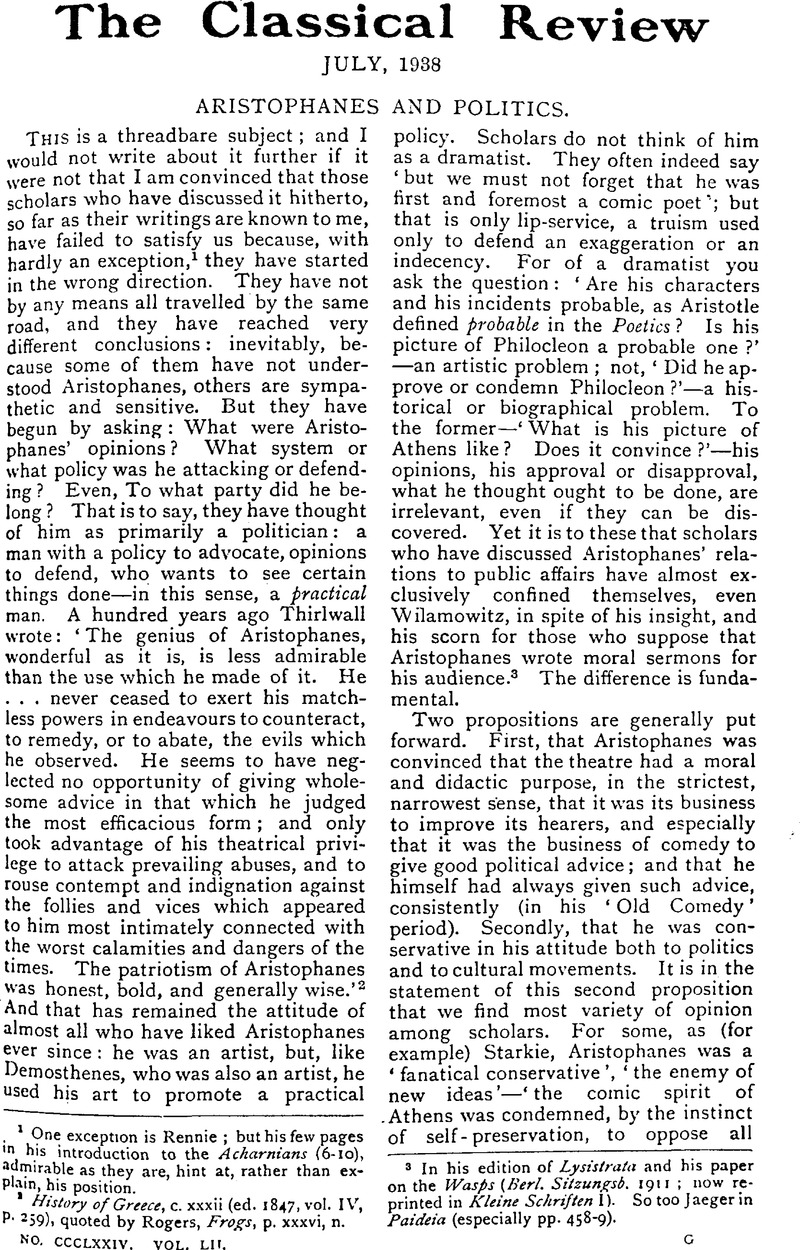Article contents
Aristophanes and Politics
Published online by Cambridge University Press: 27 October 2009
Abstract

- Type
- Review Article
- Information
- Copyright
- Copyright © The Classical Association 1938
References
page 97 note 1 One exception is Rennie; but his few pages in his introduction to the Acharnians (6–10), admirable as they are, hint at, rather than explain, his position.
page 97 note 2 History of Greece, c. 32 (ed. 1847, vol. IV, P.259)Google Scholar, quoted by Rogers, , Frogs, p. 36, nGoogle Scholar.
page 97 note 3 In his edition of Lysistratti and his paper on the Wasps (Berl. Sitzungsb. 1911; now reprinted in Kleine Schrijten I). So too Jaeger in Paideia (especially pp. 458–9).
page 98 note 1 Contrast the pamphlet of the‘Old Oligarch’, written for a political group and not even published in the author's lifetime.
page 98 note 2 Aristophanes and the Political Parties, Engl. transl., p. 7.
page 98 note 3 Ed. Acharn., p. 8.
page 99 note 1 Equit. 805–8. Neil notes here the use of ⋯ριμ⋯ς, elsewhere ‘specially used of the dicast keen for condemnation…, and generally of the democratic temper… as often in Plato’;but even Neil, misled by his faith in Aristophanes the defender of the countryman, can add the ἄγροικος here corrects any disparagement conveyed by the adjective’.
page 99 note 2 Macan, , Herodotus IV-VI, vol. ii, p. 186Google Scholar.
page 99 note 3 Macan, ibid.
page 99 note 4 Especially 562:
εῖτ’ εἰ δἰκαια, το⋯τον εἰπεῖν αὔτ’ ⋯χρ⋯ν:
page 100 note 1 Aristophanes, p. 107.
page 100 note 2 Political Parties in Athens, pp. 98 f.
page 100 note 3 Panhellenistn in Aristophanes, pp.27 f., 48
page 101 note 1 In Manitoba Essays, 1937, pp. 190–219.
page 101 note 2 Note on 1. 1443, in his translation of the Frogs.
page 101 note 3 Frogs, 1039.
page 101 note 4 P. 82.
page 102 note 1 Cf. Ach. 370–6, which give a picture just like that in the Wasps.
page 103 note 1 Cf. below, p. 108.
page 105 note 1 Equit. 782. One might equally say that he sends a thrill with the democratic and imperialist oracle: Equit. 1011–3, Av. 978.
page 106 note 1 I am not saying that there may not be a special, extra-dramatic, point in the ‘alliance’ between the poet and the Knights. It may be that many of the latter had actively supported him in his trouble with Cleon after the Babylonians. But, if so, it would be as permissible to argue that their support had been more embarrassing than helpful, and that Aristophanes intended the Knights to be a satire on oligarchic reformers: these self-styled καλο⋯ κ⋯γαθο⋯, ⋯πιεικεῖς,β⋯λτιστοι, in effect only propose to get rid of Cleon by putting Athens —including themselves—in the power of a similar demagogue; demagogy of the right isvery like that of the left. (Similarly Vesp.1335 ff. could be taken as a satire on Bdelycleon's improvements.)
But I prefer to believe that though, when he wrote Ach. 300–1, Aristophanes had in mind a definite attack on Cleon, later, when he came to write the Knights, his dramatic genius got the better of him; and that in fact he does not attack, but gives a picture of contemporary Athenian politics.(So, in the case of this play, Jaeger, , Paideia, p. 463.Google Scholar)
page 106 note 2 Hypothesis i, ad fin.
page 107 note 1 As the frequency is relevant, here is a by no means exhaustive list: (1) the dissolute young oligarchs (the type disliked by the Cleon of the Knights, as in Thucydides)—Ach. 601 ff.; 716, 843 ff.; Eq. 877; Nub. 1088 ff.; Vesp. 486, 687, 887–90, 1299 ff.; Ran. 1513; (2) the sailors—Ach. 162–3, 64S, 677; Eq. 551 8 l 3 ff., 1063–6, 1182–6, 1300 ff., 1366–71; Vesp. 909, 1091 ff., 1189; Lys. 804; Ran. 49–50, 698, 1071 ff., 1465 (cf. 535–7 and 999–1004).
page 107 note 2 For example, 362–3.
page 108 note 1 Cf. the opening lines of the passage in the Peace above referred to, 734–8.
page 108 note 2 Not including those odes which are songs mocking individuals.
page 108 note 3 Nub. 522.
page 108 note 4 Vesp. 1044.
page 108 note 5 Vesp. 65–6.
page 108 note 6 Nub. 547.
page 108 note 7 Vesp. 1048–9.
page 109 note 1 738 ff.
page 109 note 2 Note, for example, Equit. 229. κ⋯γὼ μετ’ αὐτ⋯ν χὠ θε⋯ς ξυλλ⋯ψεται exactly in the manner of the slave of New Comedy.
- 15
- Cited by


